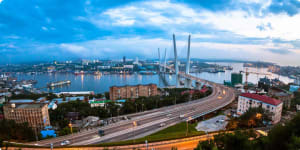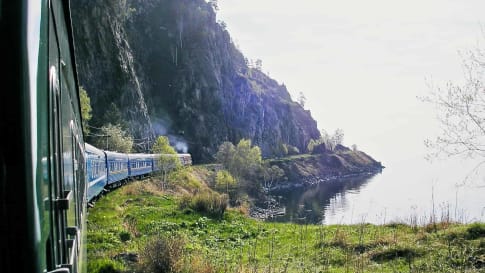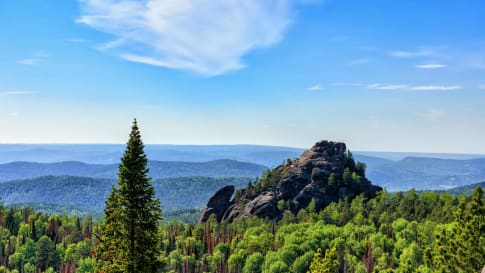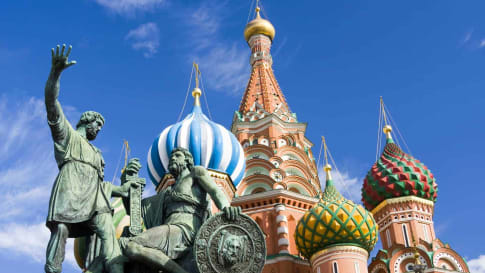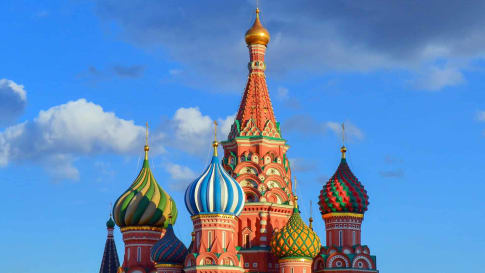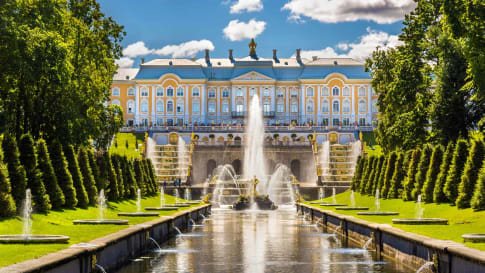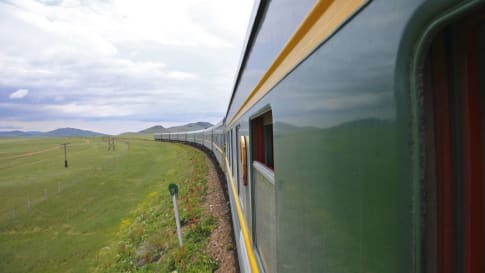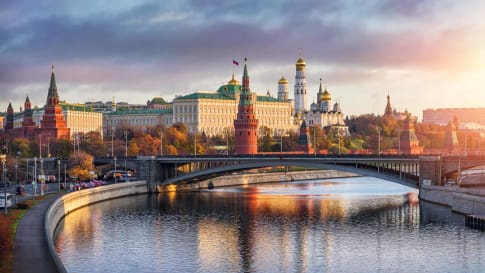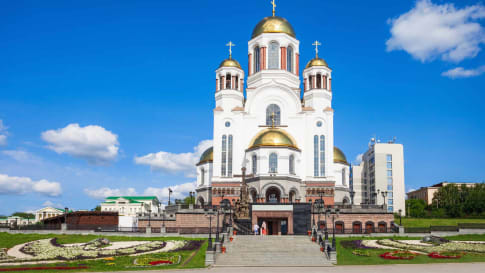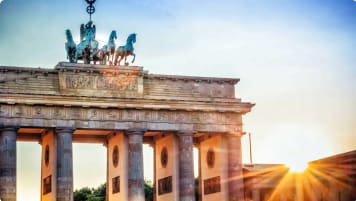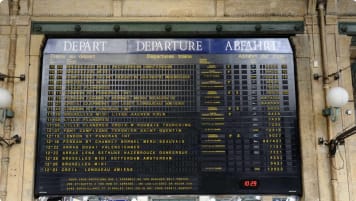Krasnoyarsk to Vladivostok on the Trans-Siberian Railway
Mature and solo travelers group Travel on the Trans-Siberian Railway for 22 days covering the second half of the Trans-Siberian journey, from Vladivostok to Krasnoyarsk to Vladivostok on the edge of Siberian Russia Small group journeys with a tour leader, explores 5 key cities with local guides providing authentic experiences in each with stops of 2-3 nights.
From $13,697NZD
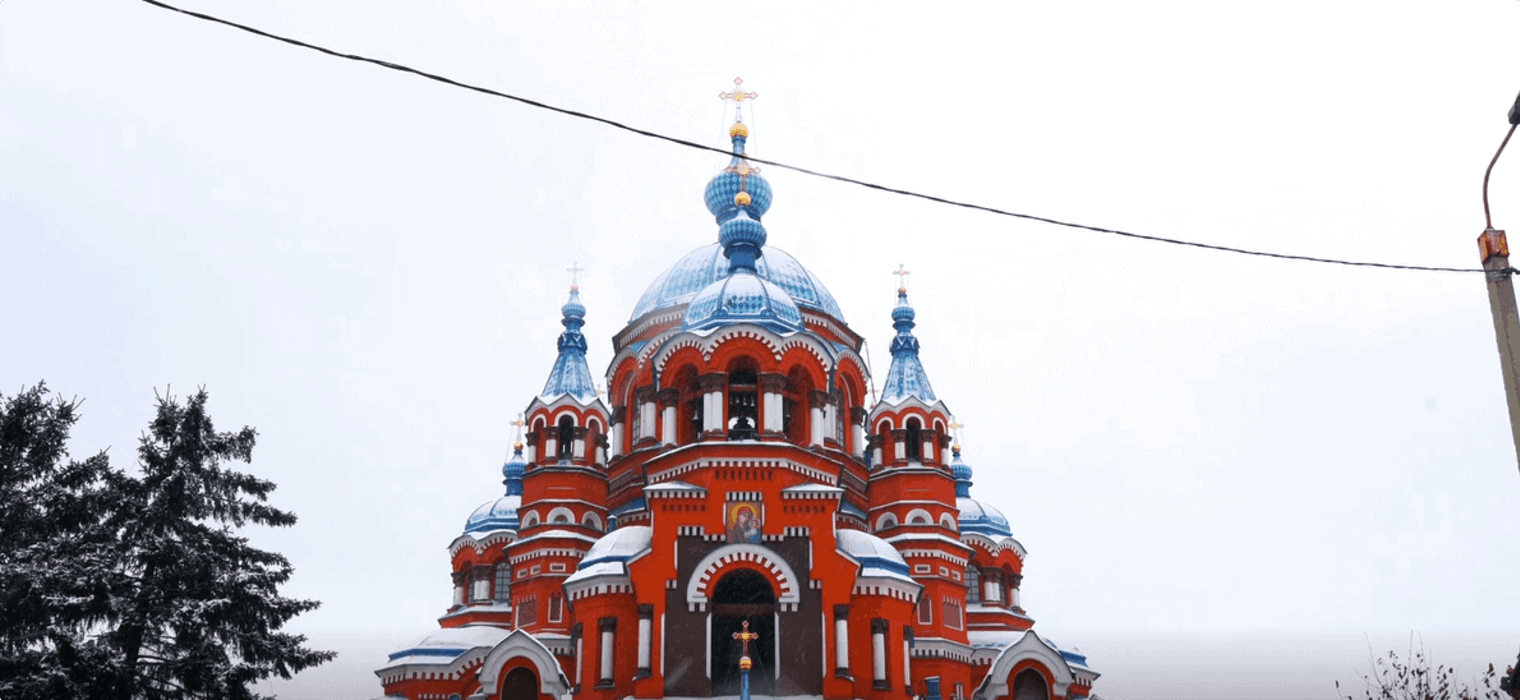
Highlights
- 1. Visit Lake Baikal, one of the world’s oldest and deepest freshwater lake, and home to numerous endemic species.
- 2. Experience life in the preserved village of Taltsy at the Taltsy Architectural and Ethnographic Museum.
- 3. See the Bolshoy Salbysky Burial Mound, an ancient religious and astronomical monument.
- 4. Deepen your knowledge of Russian history as you travel on the Trans-Siberian Railway to the train journey's final stop in the Far East, Vladivostok.
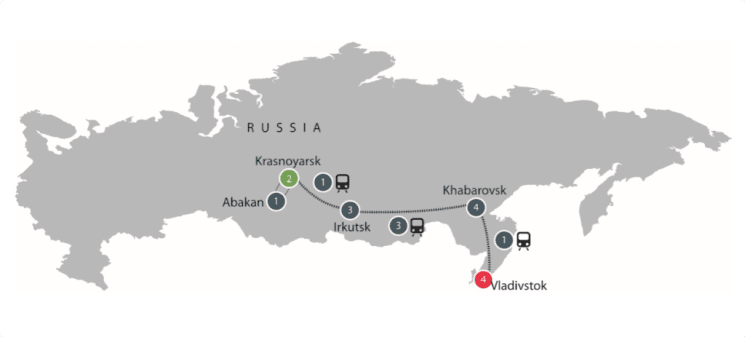
Departure Dates
| Departure Date | Price |
|---|---|
| 14 October 2024 Ends 04 November 2024 • 22 days $13,697 Twin $14,888 Single Available | Selected |
Krasnoyarsk to Vladivostok Trans-Siberian Rail Journey in 22 days
SUSPENDED UNTIL FURTHER NOTICE.
For details on our programs and an up-to-date list of guaranteed departures, please https://www.odysseytraveller.com/tour-category/guaranteed/
Join Odyssey Traveller on this Krasnoyarsk to Vladivostok Trans-Siberian Rail Journey. During this escorted small group tour we embark on the greatest train journey in the world, the Trans-Siberian Railway. The tour covers the second leg of the Trans-Siberian journey, travelling further east from Krasnoyarsk in the heart of Siberian Russia to the port city of Vladivostok, where Russia shares its border with China and juts out into the Pacific Ocean. Vladivostok is the eastern terminus of the main Trans-Siberian route.
This 22-day tour is designed for the mature or senior traveller interested in history and culture, whether travelling alone or with company. Group size is typically between four to 12 travellers, fully escorted by an Odyssey Program Leader and local guides. This small group tour offers flexibility, focused attention, and stops in cities and towns not usually included in other commercial tours, promising a unique experience even on this train journey that has been attempted by millions of travellers.
This tour spends multiple nights in:
- Krasnoyarsk, located more than 4,000 kilometres from Moscow, one of the oldest Siberian towns
- Abakan, the capital city of the Republic of Khakassia and dubbed the Siberian "Archaeological Mecca"
- Irkutsk, the jewel of eastern Siberia
- Khabarovsk, sitting on the bank of the Amur River just 20 kilometres from the border with China
- Vladivostok, which means "lord of the east", where in 1891 tsar-to-be Nicholas first laid the stone that would be the foundation of the Trans-Siberian Railway
For more details, click the ‘Top 5’ or ‘Itinerary’ buttons above! If you’re keen to experience this tour, please call or send an email. Or, to book, simply fill in the form on the right-hand side of this page.
Other Odyssey Traveller Tours by Railway
Odyssey Traveller regularly offers tours designed for the mature or senior traveller to enjoy in a small group holiday and learning environment. We also publish articles to provide more information to our loyal and prospective participants.
Prepare for the Krasnoyarsk to Vladivostok Trans-Siberian Rail Journey
If you want to learn more about the Trans-Siberian Rail and the train journey to Krasnoyarsk, click through to read the following articles prepared by Odyssey Traveller:
- Trans-Siberian Railway overview, which includes tips on booking your ticket and preparing for the long train ride
- History of the Trans-Siberian Railway
- Trans-Siberian Landscapes and Wildlife
You may also want to check out our other tours also travelling on the Trans-Siberian Railway, one travelling from Mongolia to Russia and the other traversing the rails from Helsinki to Irkutsk. You can also learn more about Russia from our country profile.
For a different pace and cultural experience, you may want to explore our other small group tours by rail:
- Japan History by Rail tour which journeys through Japan on the shinkansen (high-speed train)
- French History by Rail tour which goes through Paris and the other cities of France; we have a 21-day tour and a shorter 11-day tour
Other articles of possible interest is this two-part post filled with travelling tips for seniors, an article on the many nifty gizmos and gadgets you can bring on your trips, and an important article about practising responsible travel.
Gallery
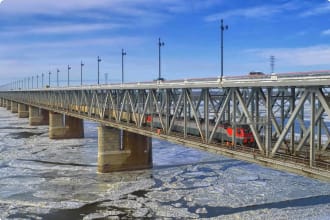
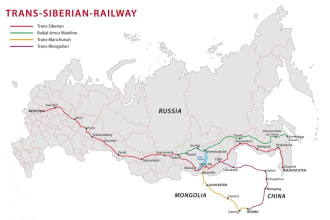
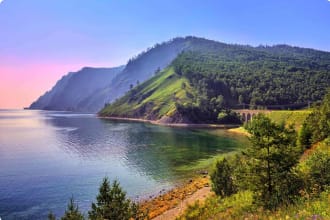
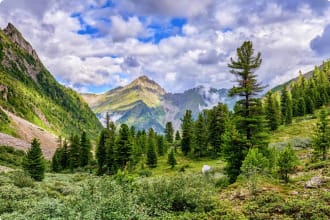
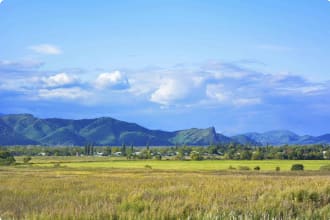
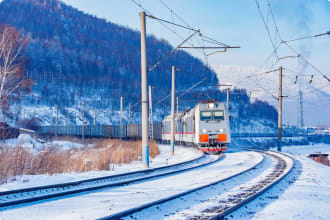
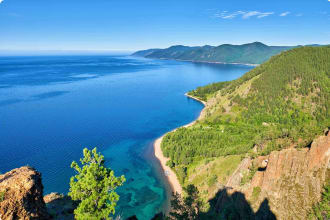
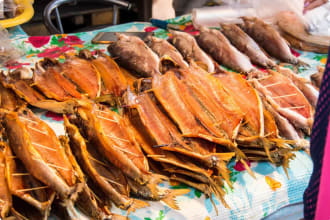
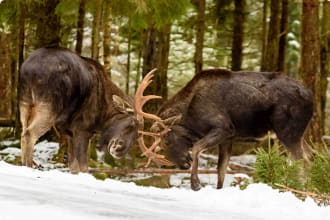
Itinerary
22 days
Day 1: KRASNOYARSK
Accommodation: Novotel or similar
Upon arrival in Krasnoyarsk, we make our own way to our hotel. After freshening up, we head out as a group for a short city tour. Here we take in the important sites in the city, including Mira Square (Peace Square), the oldest square in historic Krasnoyarsk. The city’s historical gateway, the Arch of Triumph, stands here in the place of a tower of Krasnoyarsk Prison, which burned down in 1773. Mira Square offers a view of the Yenisey River. We ascend to Karaulnaya Hill, a good vantage point to see the whole of the city. We will also visit a monument to its founder, Andrey Dubensky, and the Praskovya Pyatnitskaya Chapel.
Krasnoyarsk, located more than 4,000 kilometres from Moscow, is one of the oldest Siberian towns. It was founded by Russian traders and Cossack explorers in 1628, nearly a quarter of a century after a Cossack expedition led by Yermak Timofeyevich captured Isker, capital of the khanate of Sibir (from which Siberia derives its name), beginning Russia’s expansion into the region.
The rest of the day can be spent at our leisure. In the evening, we meet together again for dinner and orientation concerning the rest of the tour.
Day 2: KRASNOYARSK TO ABAKAN
Accommodation: Hotel Asia or similar
Today we will get ready for a 410-km drive to Abakan, the capital city of the Republic of Khakassia in Central Russia. The indigenous Khakass people (who speak the Turkic language of the same name) make up only about 10 percent of the total population of the republic; the rest are Russians. The Khakass were originally nomadic herders, and raising sheep and goats remain to be a part of their way of life. The republic is also rich in minerals, which was what motivated Russians to settle in the area in the 18th century.
Dubbed Siberia’s “Archaeological Mecca”, the region has witnessed human activity for 30,000 years, and this habitation left behind many archaeological sites. We will learn more about the region’s history as we visit these sites including the Bolshoy Salbysky Burial Mound, a religious and astronomical monument dating back to the 5th-4th centuries BC; the Khakass National Museum of Local Lore, which holds a vast Paleolithic collection; the Spaso-Preobrazhensky Cathedral containing icons of Siberian saints; and the city’s river port overlooking the great Yenisey River.
Day 3: ABAKAN TO KRASNOYARSK
Accommodation: Novotel or similar
We return to Krasnoyarsk and visit the Krasnoyarsk Hydroelectric Power Station dam, the first power station built on the Yenisey. The dam is located 30 kilometres upstream and we will drive through beautiful countryside. Midway through to the dam we will stop on a lookout place that offers a gorgeous view of the river and the Siberian forests.
After this, we will visit the Stolby Nature Sanctuary. Founded in 1925 by locals, Stolby (“pillars”) derives its name from the unusual shapes of its rock formations mostly of sedimentary and volcanic origin, dating back to the Cambrian Period, making the rocks more than 600 million years old. A small portion of the huge nature reserve (“Central Stolby”, around 4% of the reserve’s total land area) is open to the public, while the rest (“Wild Stolby”) is not recommended to tourists. The nature reserve is surrounded by taiga (name given to the forests of the cold, subarctic region), so the flora is predominantly made of coniferous trees such as pine and silver fir.
Day 4-5: KRASNOYARSK TO IRKUTSK
Accommodation: Hotel Yevropa or similar
Today we will hop aboard the Trans-Siberian Railway and travel by train for 20 hours eastward to Irkutsk. We will watch the pine and fir trees of the taiga pass by through our train windows. The Trans-Siberian trains moves at a speed of at most 90 km/h, giving passengers a time to relax, chat with fellow travellers, and sip hot tea courtesy of the samovar.
When we arrive in Irkutsk, we will settle in our hotel and rest to get ready for tomorrow’s city tour.
Day 6: IRKUTSK
Accommodation: Hotel Yevropa or similar
Today we will go on a city tour and experience Irkutsk’s history through its architecture and museums. We will learn more about the Novemberists, the October Revolution, the Red and White Armies of Russia, and the Bolsheviks who came to power after the fall of the tsarist regime.
Irkutsk is often called the “de facto capital” of Eastern Siberia. Irkutsk became a place of exile for intellectuals, artists, and nobles who revolted against Tsar Nicholas I in the early 19th century–at one point there were two exiles per local residing in the city–turning Irkutsk into a scholarly and artistic hub. Their influence is still very palpable in the city’s architecture and aesthetics.
We will visit the Taltsy Architectural and Ethnographic Museum, which used to be the site of a real village called “Taltsy”. When the Ust-Ilimskaya hydroelectric power station was constructed, a part of Taltsy came in danger of being flooded. The Russian government decided to evacuate the people out of town and preserve the village–complete with water mills, houses, and a school–as a museum. (Depending on time, the trip to Taltsy might be combined with the trip to Lake Baikal–see Day 8.)
Day 7: IRKUTSK
Accommodation: Hotel Yevropa or similar
Today we will go on a trip to Lake Baikal, the largest, deepest, and oldest freshwater lake in the world. It contains nearly a quarter of the world’s fresh surface water, more water than all of the Great Lakes of North America combined. It has a depth of 1.6 kilometres (around a mile) and is considered the world’s oldest lake at 25 to 30 million years old. Lake Baikal is home to more than 1,700 species of plants and animals, 80% of them endemic to the area, which means these species are found nowhere else. The Circumbaikal Railway train chugs along around the perimeter, offering a scenic and leisurely ride around the lake. If time permits, we will take a boat trip on the lake itself.
Day 8-11: IRKUTSK TO KHABAROVSK
Accommodation: Hotel Parus or similar
We will once again board a train and travel on the Trans-Siberian Railway to Khabarovsk. This will be our longest journey on the train–around two days and 17 hours. Make sure to settle in and get comfortable!
At this point we are moving ever closer to the Russian Far East, and we will see the landscape change from the taiga to something akin to the tropics, green monsoon forests with a lush undergrowth.
Upon arrival we shall head to our hotel and rest. At this point, we have arrived in a city that is more than 8,500 kilometres from Moscow!
Day 12: KHABAROVSK
Accommodation: Hotel Parus or similar
After more than two days on the train, we will enjoy a much-deserved free day in this new city to catch up with laundry, relax, and restore our energies for the trip ahead.
Day 13: KHABAROVSK
Accommodation: Hotel Parus or similar
Khabarovsk is capital of Khabarovsk Krai and sits on the right bank of the Amur River. As the Russian Empire expanded to the east, it eventually encroached on Chinese territory, which was halted by the Treaty of Nerchinsk, signed in 1689 between Russia and the Manchu Chinese Empire. Under the Treaty of Nerchinsk, Khabarovsk, named after 17th-century Russian explorer Yerofey Khabarov, was neutral territory. In 1858, Khabarovsk was founded as a military post by Eastern Siberia’s governor-general, Count Nikolai Muravyov (later Muravyov-Amursky) in an effort to take the Amur back from the Manchus and develop Siberia. The Trans-Siberian Railway arrived here from Vladivostok in 1897, which further spurred the city’s development.
We will learn more about Khabarovsk’s history with our walk down Muravyov-Amursky Street (named after Khabarovsk’s founder) which is flanked by historic buildings and monuments, and a visit to the city’s oldest museum, the Regional Lore Museum.
We will have the afternoon free to spend at our leisure.
Day 14: KHABAROVSK
Accommodation: Hotel Parus or similar
Today we will immerse ourselves in the culture of the Nanai, an indigenous people of the Far East who have traditionally lived along the Amur and Ussuri Rivers and whose economy was based on fishing. We will visit the Nanai Cultural Museum and view petroglyphs dating back to the 13th century BC. We will learn more about the Nanai’s traditional meals, view the process of drying fish skin to use in their clothing, and if time permits, attend a Nanai folk concert.
Day 15-16: KHABAROVSK TO VLADIVOSTOK
Accommodation: Hotel Versailles or similar
We will make our final train journey on the Tran-Siberian Railway, heading to the train’s eastern terminus, Vladivostok. This journey will take at most 15 hours. Vladivostok is the administrative centre of the Primorsky Krai, which is bounded by the Ussuri river and dominated by the Sikhote-Alin Mountains. The Sikhote-Alin Range is a 1,200-km (750-mile) mountain complex fronting the Sea of Japan, which should offer breathtaking views as we relax on the train.
We head to our hotel upon arrival and the remainder of the day is free.
Day 17: VLADIVOSTOK
Accommodation: Hotel Versailles or similar
Vladivostok was founded in 1860 as a Russian military outpost. Its name (“lord of the East”) reflects the Russian Empire’s expansionist dreams. It served as Russia’s naval base due to its position in the Pacific. In March 1891, tsar Alexander III officially announced the building of a Trans-Siberian Railway. His son and heir apparent Nicholas (later tsar Nicholas II) laid the first stone at Vladivostok (“lord of the East”), and the railway crept westward to connect European Russia with Far Eastern Siberia.
Today we will take a morning tour of the city by visiting several monuments–Arsenev Regional Museum, Hermitage Vladivostok, Vladivostok Fortress Museum, and Primorsky Picture Gallery. We will take a short ride on the cable cars of the Vladivostok Funicular which goes up the slope of Orlinaya (Eagle) Hill, offering a scenic view of Golden Horn Bay, which is connected to the Sea of Japan.
We then have the afternoon free to spend at our leisure.
Day 18: VLADIVOSTOK
Accommodation: Hotel Versailles or similar
Today is a free day to be spent at our leisure.
Day 19: VLADIVOSTOK
Accommodation: Hotel Versailles or similar
Today we will venture further away from the city centre and visit the Zayra (“Dawn”) Centre for Contemporary Art. The centre was opened in 2013 in an old Soviet garment factory and serves as an artistic space for the city. It holds modern art exhibitions, film screenings, and lectures, and has a beautiful reading room and a small coffee shop.
In the afternoon we will enjoy a relaxing cruise to view the bridges of Vladivostok: the first spanning Golden Horn Bay, the second across the Eastern Bosphorus strait to Russky Island (Russian Island), and the third across Amur Bay.
The late afternoon will be free for us to spend at our leisure.
Day 20: VLADIVOSTOK
Our tour and our services conclude after breakfast.
Includes / Excludes
What’s included in our Tour
- 14 nights hotel accommodation.
- 5 nights travel aboard the Trans Siberian in 4 berth compartments, with exclusive use for 2 or 3 people (depending on final group size and train type availability).
- Meals as indicated in the itinerary.
- Transport and field trips as per itinerary.
- Applicable entry fees and services of local guides.
- Gratuities and necessary tips.
- Invitation letter for Russian Visa.
- Services of an Odyssey program leader.
- Detailed Tour Information Booklet.
What’s not included in our Tour
- International airfares and departure taxes
- Comprehensive International Travel Insurance.
- Cost for Russian Visa. Odyssey will assist in obtaining the invitation letter.
- Meals not specified in the itinerary.
- Items of a personal nature, such as telephone calls and laundry.
Participants must be able to carry their own luggage, climb and descend stairs, be in good health, mobile and able to participate in 3-5 hours of physical activity per day, the equivalent of walking / hiking up to 8 kilometers per day on uneven ground.
Book now
Make it a private tour
Easing your journey
Crossing international borders with restrictions
The list of requirements to travel internationally has changed and will continue to change for several years. Odyssey is here to assist you in managing your way through these requirements:
For more information see our Crossing international borders with restrictions page.
Book With Confidence
If less than 30 days before your tour starts you are unable to travel as a result of Government travel restrictions, Odyssey Traveller will assist you with a date change, provide you with a credit or process a refund for your booking less any non-recoverable costs.
See Terms and conditions for details.
Peace of Mind Travel
The safety of our travellers, tour leader, local guide and support staff has always been our top priority and with the new guidelines for public health and safety for keeping safe for destinations around the world, we’ve developed our plan to give you peace of mind when travelling with us.
See Peace of Mind Travel for details.
Reading List Download PDF
A History of Modern Russia: From Nicholas II to Vladimir Putin
Robert Service
Russia had an extraordinary twentieth century, undergoing upheaval and transformation. Updating his acclaimed History of Twentieth-Century Russia through 2002, Robert Service provides a panoramic perspective on a country whose Soviet past encompassed revolution, civil war, mass terror, and two world wars. He shows how seven decades of communist rule, which penetrated every aspect of Soviet life, continue to influence Russia today. This new edition also discusses continuing economic and social difficulties at the beginning of the twenty-first century, the military campaign in Chechnya, and Russia's reduced role on the world stage.
To the Edge of the World: The Story of the Trans-Siberian Express, the World's Greatest Railroad
Christian Wolmar
To the Edge of the World, is an adventure in travel—full of extraordinary personalities, more than a century of explosive political, economic, and cultural events, and almost inconceivable feats of engineering. Christian Wolmar passionately recounts the improbable origins of the Trans-Siberian railroad, the vital artery for Russian expansion that spans almost 6,000 miles and seven time zones from Moscow to Vladivostok. The world's longest train route took a decade to build—in the face of punishing climates, rampant disease, scarcity of funds and materials, and widespread corruption.
The line sprawls over a treacherous landmass that was previously populated only by disparate tribes and convicts serving out their terms in labor camps—where men were regularly starved, tortured, or mutilated for minor offenses. Once built, it led to the establishment of new cities and transformed the region's history. Exceeding all expectations, it became, according to Wolmar, “the best thing that ever happened to Siberia.”
It was not all good news, however. The railroad was the cause of the 1904–1905 Russo-Japanese War, and played a vital—and at times bloody—role in the Russian Revolution and the subsequent Civil War. More positively, the Russians were able to resist the Nazi invasion during the Second World War as new routes enabled whole industries to be sent east. Siberia, previously a lost and distant region, became an inextricable part of Russia's cultural identity. And what began as one meandering, single-track line is now, arguably, the world's most important railroad.
Strange Siberia Along the Trans-Siberian Railway: A Journey From the Great Wall of China to the Skyscrapers of Manhattan
Marcus Lorenzo Taft
Excerpt from Strange Siberia Along the Trans-Siberian Railway: A Journey From the Great Wall of China to the Skyscrapers of Manhattan
Throughout our journeyings in the Tsar's dominions, we were entirely free from any dread of being shadowed by a Russian spy. During our sojourn at Tomsk, the capital of Siberia, we were not even asked to show our passport. Who can say but that our ex emption from all such espionage, of which travelers in Russia so generally complain, was due to the fact that a playful child was unconsciously acting as mascot for our Taft party?
East of the Sun: The Epic Conquest and Tragic History of Siberia
Benson Bobrick
The very word Siberia evokes a history and reputation as awesome as it is enthralling. In this acclaimed book on Russia’s conquest of its eastern realms, Benson Bobrick offers a story that is both rich and subtle, broad and deep.
From its conquest by Cossacks and its exploration and settlement in the sixteenth and seventeenth centuries, through its terrifying Gulag history, to its modern place in a world hungry for natural resources, Siberia –covering a sixth of the world’s surface – has a history unlike any other land. East of the Suncaptures all of Siberia’s history with a depth and flavor that will satisfy both well-informed historians and newly-cast Russophiles alike.
Lonely Planet Russia (Travel Guide)
Simon Richmond et al
Lonely Planet Russia is your passport to the most relevant, up-to-date advice on what to see and skip, and what hidden discoveries await you. Brush up on your Soviet and imperial history in Moscow and St Petersburg, explore European Russia and its gingerbread cottages and golden domes, or lose yourself in the wilds of Siberia and the east; all with your trusted travel companion. Get to the heart of Russia and begin your journey now!
